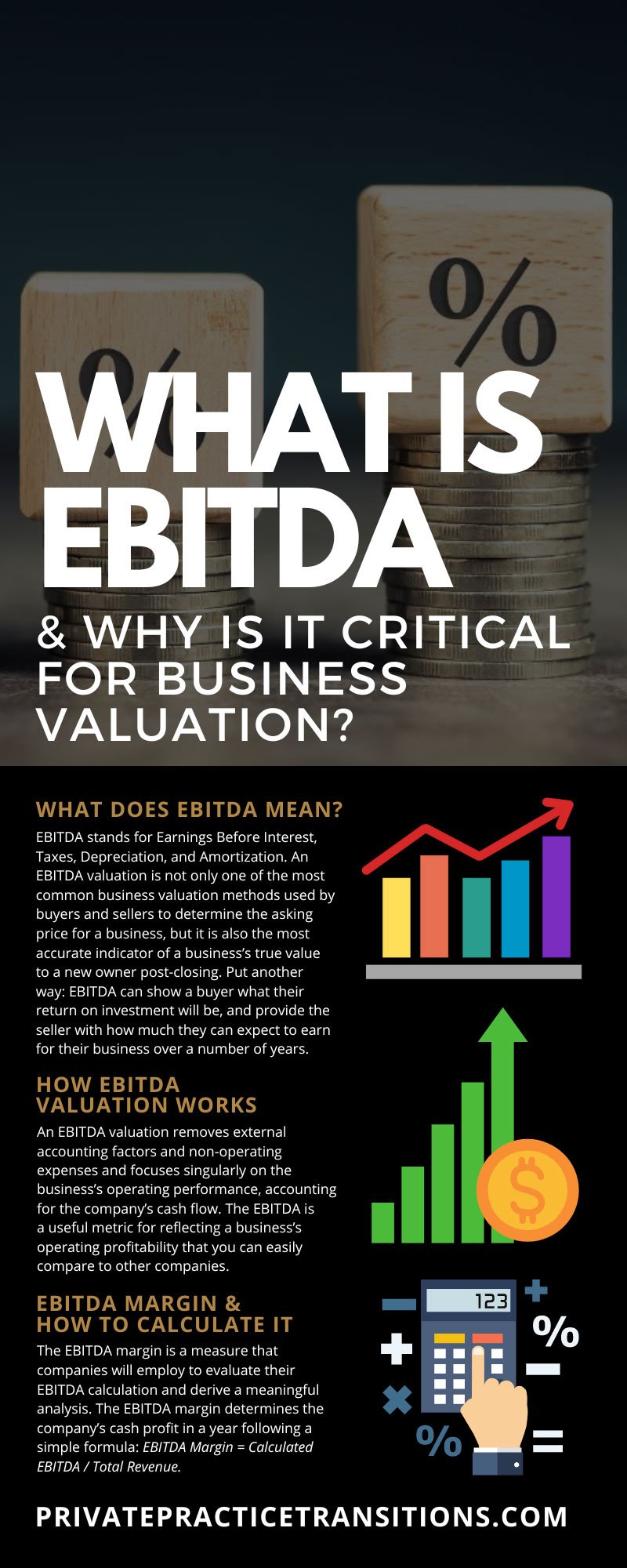Knowing how to accurately calculate a business’s EBITDA is one of the most important factors when buying or selling a business. But what does EBITDA mean, and why is it critical for business valuation? We answer those questions and more in our guide to EBITDA valuations below.
What Does EBITDA Mean?
EBITDA stands for Earnings Before Interest, Taxes, Depreciation, and Amortization. An EBITDA valuation is not only one of the most common business valuation methods used by buyers and sellers to determine the asking price for a business, but it is also the most accurate indicator of a business’s true value to a new owner post-closing. Put another way: EBITDA can show a buyer what their return on investment will be, and provide the seller with how much they can expect to earn for their business over a number of years.
The Components of EBITDA
Most of the components of an EBITDA valuation are simple and self-explanatory, but if you’re unsure about any of them, we’ve explained each aspect below.
Earnings
The earnings component is fairly straightforward—it’s the company’s earnings or taxable net income for a specified period or full calendar year, as set forth on a federal tax return (the return being the most common benchmark). While the time frame for the figures in an EBITDA valuation may vary, the most commonly used time frames are calendar year or trailing twelve months (TTM). A longer time frame (two to three years) may be a more accurate benchmark if your business has experienced significant growth or volatility in earnings.
Conversely, you can expect a stronger valuation if your earnings have remained consistent, as consistently strong earnings show the company’s profits are stable.
Interest
Interest expenses are the cost of the company’s debt accrued over the years. Many businesses have lines of credit, credit cards, or have used leverage to expand through acquisitions. The interest component quantifies the interest on this debt or the amount the company must pay on top of the principal debt payment.
The use of debt in a responsible way does not negatively impact valuation as all interest related to debt is added back. That being said, too much debt on the balance sheet can be a “red flag” for business valuation purposes.
Taxes
Along with debt and interest, every business also must pay taxes. The EBITDA formula considers the total payment amount for local, state, and federal taxes.
Depreciation & Amortization
We grouped depreciation and amortization because what they analyze is similar. Depreciation represents the gradual write-off of the value of tangible assets of the company, like furniture, fixtures, and equipment.
Amortization also analyzes the gradual write-off of the value of a company’s intangible assets. Intangible assets include goodwill purchased in an acquisition, patents, intellectual property, or copyrights. Like the depreciation of tangible assets, intangible assets can be amortized (i.e., written off) over a period of years.
How EBITDA Valuation Works
EBITDA valuation adjusts a company’s earnings by “acting” as if expenses, such as taxes, interest, amortization, and depreciation, never “hit” the books.
In other words, an EBITDA valuation removes external accounting factors and non-operating expenses and focuses singularly on the business’s operating performance, accounting for the company’s cash flow. The EBITDA is a useful metric for reflecting a business’s operating profitability that you can easily compare to other companies.
How To Calculate EBITDA
You must correctly gather and plug each component’s figures into the appropriate formula below to obtain an EBITDA valuation. Business evaluators will typically use the following formula:
- EBITDA = Net Profit + Interest + Taxes + Depreciation + Amortization
All the information needed for calculating this formula should be in the company’s tax returns and income statements, which is why businesses must have reliable and accurate accounting systems to ensure an accurate valuation and analysis.
EBITDA Margin & How To Calculate It
The EBITDA margin is a measure that companies will employ to evaluate their EBITDA calculation and derive a meaningful analysis. The EBITDA margin determines the company’s cash profit in a year following a simple formula: EBITDA Margin = Calculated EBITDA / Total Revenue.
For example, if a company has an EBITDA of $500,000 with a total revenue of $5 million, its EBITDA margin would be 10 percent (500,000 / 5,000,000 = 0.10). Buyers and sellers can compare the EBITDA margins between companies to determine which has greater growth potential.
EBITDA Multiples
Another critical aspect of EBITDA valuation is EBITDA multiples. EBITDA multiples are fixed ratios allocated to different sectors when valuing businesses across industries. EBITDA multiples reflect the average price of a company based on industry benchmarks of similar sales and recommendations from equity analysts.
You can calculate an EBITDA multiple using the following formula: EBITDA Multiple = Enterprise Value / EBITDA. With this metric, you can determine a business’s value to be over or understated. The higher the ratio, the more overstated its value might be.
Enterprise Value
We mentioned enterprise value for determining EBITDA multiples, but what does that mean? Determine the enterprise value by calculating the sum of debts, minority interest, market capitalization, and preferred shares.
Once you calculate this sum, you must subtract the business’s cash and cash equivalents (marketable securities, bank accounts, treasury bills, and more). Enterprise Value = (Market Capitalization + Value of Debt + Minority Interest + Preferred Shares) – (Cash & Cash Equivalents).
The Benefits of an EBITDA
We know what EBITDA is, but why is it critical for business valuation? First, EBITDA is one of the most used business valuation methods across every industry sector and is a good baseline metric to know whether you should buy or sell a business.
EBITDA is also useful because it removes variables unique to the business and industry, so it’s easier for buyers and sellers to look at the financial fundamentals of a business without the distraction of other variables. As you can see, EBITDA is relatively easy to calculate, so you can calculate it quickly to give business sellers and buyers an efficient and firm grasp of their company’s value.
Where To Get An EBITDA Business Valuation
Consider Private Practice Transition’s business valuation services if you’re interested in selling or would like a snapshot of your business’s health. Our expert evaluators will use multiple factors to determine your business’s value, including EBITDA, trends in gross revenue, comparison to other transactions, and more. Learn about our services online or contact our staff today.







